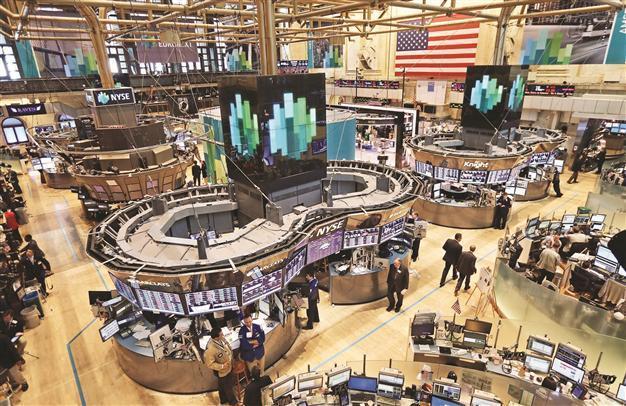Modest Fed move disappoints markets
LONDON - The Associated Press

Traders work the floor of the New York Stock Exchange as they wait for a speech by Federal Reserve Chairman Ben Bernanke. At the end of a two-day policy meeting the Fed said it was extending a program to swaps short-term bonds for longer-term ones. AFP photo
Global markets fell yesterday after the Federal Reserve balked at providing major new stimulus to the U.S. economy, while key surveys showed manufacturing activity continued to contract in both China and Europe, raising concern over the outlook for the world economy.
At the end of a two-day policy meeting on June 20, the Fed said it was extending a program called Operation Twist, under which the Fed swaps short-term bonds for longer-term ones to help keep long-term interest rates low.
But analysts said the program’s extension might not provide much benefit. Businesses and consumers who are not borrowing now are not that likely to change their minds just because rates dropped a little more.
Stan Shamu of IG Markets in Melbourne said in a market commentary that investors were “disappointed” that the Fed had not chosen to embark on a third major round of bond purchases, known as quantitative easing.
Such purchases would lower rates even further. The Fed has completed two such programs, buying more than $2 trillion in Treasury bonds and mortgage-backed securities, to help prop up the economy.
Pessimistic forecast“Sentiment also dampened after the Fed cut estimates for economic growth on the back of a slowing jobs and tough credit markets,” Shamu said.
By late morning in Europe, Britain’s FTSE 100 was off 0.5 percent at 5,596.68 and Germany’s DAX dropped 0.4 percent to 6,368.42. France’s CAC 40 shed 0.3 percent to 3,116.07.
Futures augured a weak start on Wall Street with futures for both the Dow and the S&P 500 down 0.2 percent, at 12,740 and 1,347.50, respectively.
Appetite for financial assets such as stocks was also dented by the results of a monthly HSBC survey which showed that manufacturing in China, the world’s No. 2 economy, has continued to contract. China’s growth has been a pillar of the global economy in recent years, so its slowdown has been of particular concern to investors.
In the 17-country eurozone, the equivalent manufacturing survey, called the purchasing managers’ index, fell to 44.8 points in June from 45.1 the previous month. A number below 50 indicates contraction. A related survey on the services sector also showed declining activity, suggesting a drop in GDP in the second quarter.
European finance ministers are meeting in Luxembourg later in the day to discuss ways to ease the uncertainty over their currency bloc. Fears that individual states like Spain or Italy could be overwhelmed by their debts has caused investors to shy away from lending to those countries.
Spain saw good demand in a bond auction yesterday, though it had to pay higher rates. Its borrowing costs are painfully high and will have to drop if the country is to avoid asking for international financial aid. That could depend on how much the government needs to give to its banks to keep them solvent.
An independent audit on the Spanish banks’ capital needs will be delivered to the government yesterday. Estimates have ranged from 50 billion euros to 100 billion euros (($64 billion to $127 billion).
